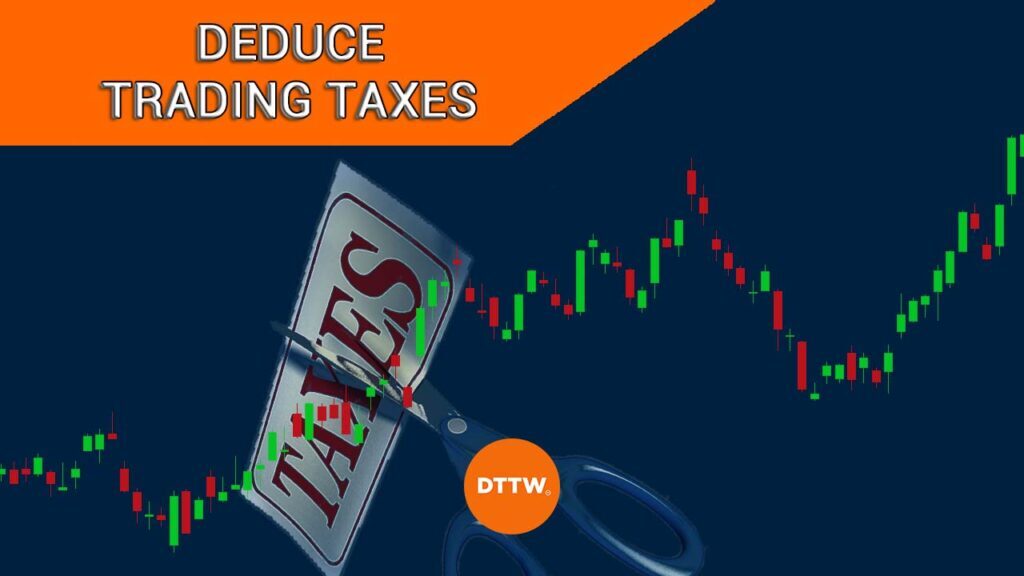Day trading is an exciting and profitable way to invest your time and money. It can also mean big deductions come tax season!
That’s why we’ve made this blog post all about maximizing your deductions when filing as a day trader. So let’s dive right in!
Table of Contents
Understand the IRS’s Definitions and Restrictions for Day Traders
The IRS categorizes day traders as “active investors” who buy and sell securities frequently to profit from short-term fluctuations in the market.
Day traders must follow specific IRS rules to qualify for certain tax benefits. For example, they must have a designated area for trading and maintain records of all trades, including the purchase price, sales price, and transaction date. Day traders can also deduct expenses related to their trading activities – we will write more about it later.
However, day traders have certain restrictions and limitations. For instance, losses from trading activities can only be used to offset gains from other trading activities, not ordinary income.
If a day trader experiences a net loss, they can carry it forward to use as a deduction in the future. Therefore, you should consider all these rules and restrictions to avoid any possible tax liabilities.
Use Tools to Track All of Your Trading Activities, Including Profits and Losses
One of the best ways to track your trading activities is by using specialized tools that are designed for just this purpose. Some of the most popular platforms on the market include TradingView, E*Trade, and Fidelity Investments.
Related » How to Keep a Trading Journal and Track Your Progress
TradingView is a comprehensive platform that allows you to track your positions, analyze charts, and receive real-time alerts. It’s compatible with multiple exchanges, including stocks, futures, and forex. This makes it an excellent choice for traders who work with multiple asset classes.
E*Trade is a popular online brokerage platform that caters to all types of traders, including day traders. With its user-friendly interface, E*Trade is an excellent choice for traders seeking flexibility.
One of the key features of E*Trade’s web platform is its real-time quotes, which allows you to access up-to-the-second market data to make informed decisions.
Fidelity Investments is another great option if you’re looking for a reliable and robust investment platform. With various investment services and account options, you can easily customize your strategy and find the best options for your unique needs.
Remember: it’s essential to do thorough research. There are many fantastic day trading platforms today that will suit your trading standards. But everyone’s needs differ, so it’s important to double-check and choose the one that fits all your specific requirements.
Deduct Expenses Related to Day Trading
As a day trader, you can deduct certain expenses from your taxes to reduce your taxable income. These expenses include those that are necessary for your day trading activities, such as equipment, education, and subscriptions to relevant publications.

One of the most important expenses to consider is equipment. If you use a computer, software, and other tools to execute your trades, these expenses are tax deductible. You may also be able to deduct any expenses related to internet or phone services that are used solely for your day trading activities.
Education is another deductible expense. This can include the cost of attending seminars or courses that help you expand your knowledge and skills as a day trader. Subscriptions to relevant publications, including financial newspapers and market newsletters, can also be claimed as a deduction.
Trading fees and commissions can be deducted as well. These expenses can add up quickly, but they can also reduce your overall taxable income. Keep track of all fees and commissions paid in any given year, and make sure to include them when you file your taxes.
Related » Benefits of an LLC company
Take Advantage of Deductions for Home-Office Expenses
Working from home can be convenient and cost-effective, but did you know it can also provide significant tax benefits? By taking advantage of deductions for home-office expenses, you can lower your taxable income and potentially reduce your overall tax bill.
You must meet certain criteria provided by the IRS to qualify for these deductions. Part of your home must be used for your business activities, and it must be your primary place of business. The space must also be clearly designated as a workspace and used only for work-related activities.
Once you meet these requirements, you can deduct expenses such as rent, utilities, internet services, and more. Additionally, you can take a deduction for the depreciation of your home office space, providing a long-term tax benefit.
Related » Why You Should Incorporate Your Day Trading Business
Consider Hiring a Tax Professional to Ensure All Deductions Are Made Correctly
While you may be able to navigate the basics of filing your taxes on your own, there are many benefits to hiring a tax accountant you should consider.
One of the main advantages of working with a tax professional is their expertise in the complex world of taxes for day traders. They can offer a wealth of information about deductions you may not have been aware of.
Another benefit of working with an experienced accountant is the assurance that your tax returns are being filed correctly and accurately. Mistakes on your tax returns can lead to hefty fines and legal complications. By hiring a professional, you can avoid these headaches altogether.
In addition to these benefits, hiring a tax accountant can also save you time and stress. Filing taxes can be a time-consuming and overwhelming process, especially if you’re also managing the demands of a day trading business. By leaving this responsibility to a professional, you can free up time to focus on other aspects of your business.
We hope these tips have been helpful to you, and we wish you the best of luck on your day trading journey!





